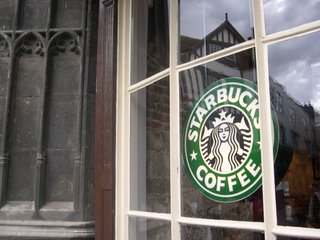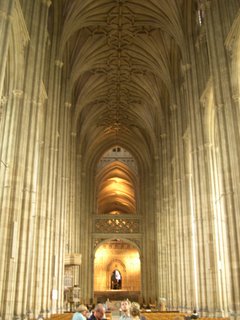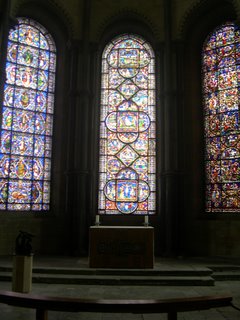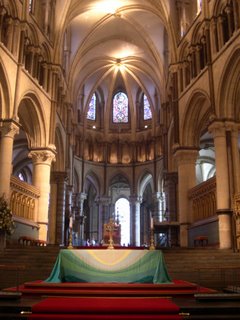Chaucer had prepared me for the streets crowded with modern pilgrims, for the stench of unwashed tourists, for the Starbuck's adjoining the cathedral gate. After all, his tales are known for their mingling of the bawdy and the sacred. I was expecting no better.
 I did not know that I would gasp upon my first view of the Nave, awed by the narrow rows of columns stretching hundreds of feet up to the peaked arches, majestic tendons of white stone. I did not know that I would find tears here, that I would be silenced for a full two hours, that I would long to raise my hands and sing.
I did not know that I would gasp upon my first view of the Nave, awed by the narrow rows of columns stretching hundreds of feet up to the peaked arches, majestic tendons of white stone. I did not know that I would find tears here, that I would be silenced for a full two hours, that I would long to raise my hands and sing.
 I did not know that I would kneel at the Chapel of the Saints and Martyrs, knees on the hard wooden bench, eyes transfixed by fragile patterns of colored glass, and find my heart swept upward in prayer for the persecuted church.
I did not know that I would kneel at the Chapel of the Saints and Martyrs, knees on the hard wooden bench, eyes transfixed by fragile patterns of colored glass, and find my heart swept upward in prayer for the persecuted church.
 Had I known, I would've come as a pilgrim, weary with the journey, rich with expectation of the glory awaiting me. Instead, I leave a pilgrim, aware of how far I still am from home, full of fresh hope for the day my voice will join with those of Augustine and Beckett and thousands more in a song of worship that will fill even these grand spaces, resonating from the depths of the crypt to the distant peak of the bell tower, spilling outward and upward in never-ending praise.
Had I known, I would've come as a pilgrim, weary with the journey, rich with expectation of the glory awaiting me. Instead, I leave a pilgrim, aware of how far I still am from home, full of fresh hope for the day my voice will join with those of Augustine and Beckett and thousands more in a song of worship that will fill even these grand spaces, resonating from the depths of the crypt to the distant peak of the bell tower, spilling outward and upward in never-ending praise.
